Focal therapy offers a variety of technologies aimed at precisely treating cancerous areas within the prostate while minimizing harm to surrounding healthy tissue. Each method uses a different mechanism to destroy targeted cells, and the choice of therapy depends on patient-specific factors, cancer characteristics, and physician expertise.
High-Intensity Focused Ultrasound (HIFU)
· Mechanism: Uses precisely focused sound waves to heat and ablate (destroy) prostate cancer cells in a targeted area.
· How it’s performed: Delivered via a transrectal probe—no incisions are necessary.
· Advantages: HIFU is currently the most commonly used focal therapy worldwide, with growing adoption in the U.S.
· Recovery: Typically performed as an outpatient procedure with minimal downtime and a relatively short recovery period.
· Side effects: Generally mild but can include temporary urinary symptoms or erectile changes in some patients.
· Limitations: Long-term data on cancer control and recurrence risk are still maturing, particularly for higher-risk disease.
Irreversible Electroporation (IRE / NanoKnife)
· Mechanism: Uses non-thermal electrical pulses to punch holes in cancer cell membranes, leading to cell death while sparing surrounding structures.
· Key benefit: Because it doesn’t rely on heat or freezing, IRE is thought to better preserve delicate surrounding tissues like nerves, blood vessels, and the urinary sphincter.
· Ideal for: Patients with tumors close to critical structures who wish to minimize the risk of side effects like incontinence or erectile dysfunction.
· Limitations: Still considered an emerging technology, with limited availability and less long-term data than HIFU or cryotherapy.
· Setting: Often performed in a research or highly specialized setting as part of ongoing studies or within centers with advanced focal therapy programs
Cryotherapy (Freezing Cancer Cells)
· Mechanism: Involves inserting thin needles (cryoprobes) into the prostate to freeze the targeted cancerous tissue, causing cellular destruction through ice crystal formation.
· Use: Can be used as a primary treatment or as a salvage therapy if prostate cancer returns after radiation therapy.
· Advantages: Has a longer history of use compared to other focal techniques and can treat both focal and whole-gland disease.
· Risks: May cause temporary urinary urgency or retention, and there is a risk of erectile dysfunction, especially with repeat or whole-gland use.
· Trends: Less commonly used today than HIFU, particularly in focal settings, but remains a valuable option in selected cases.
